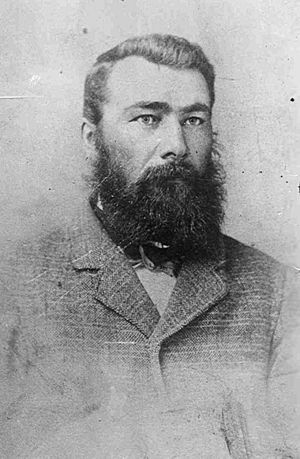Thomas McKay (Northwest Territories politician) facts for kids
Quick facts for kids
Thomas McKay
|
|
|---|---|
 |
|
| Member of the North-West Legislative Assembly for Prince Albert | |
| In office 1891–1894 |
|
| In office 1898–1905 |
|
| Mayor of Prince Albert | |
| Personal details | |
| Born | July 4, 1849 Fort Pelly |
| Died | September 25, 1924 (aged 75) |
| Spouse |
Catherine McBeath
(m. 1873) |
Thomas McKay (born July 4, 1849 – died September 25, 1924) was an important Métis leader and farmer in Saskatchewan, Canada. He was the very first mayor of Prince Albert, Saskatchewan. He also served as a representative for Prince Albert in the Legislative Assembly of the Northwest Territories. This was like being a member of parliament for the region. He served from 1891 to 1894 and again from 1898 to 1905.
Thomas McKay was Métis, a group of people with both Indigenous and European heritage. He was involved in the 1885 North-West Rebellion. During this time, he helped the Canadian government. He was one of the first 40 people to volunteer to assist Major Crozier of the North-West Mounted Police. McKay acted as a messenger, talking with Métis leaders at Duck Lake, Saskatchewan. He also worked as a scout, sending messages between Major Crozier and Colonel Irving.
Contents
Thomas McKay's Life and Work
Early Life and Family
Thomas McKay was born on July 4, 1849, in Fort Pelly. His parents were William McKay and Mary Cook. He was also the brother of James McKay. Thomas went to school at St. John's School in the Red River Colony. This area is now known as Winnipeg.
Working for the Hudson's Bay Company
From 1864 to 1873, McKay worked as a clerk for the Hudson's Bay Company. This company was very important in Canada's history. In 1873, he moved to Prince Albert, Saskatchewan. That same year, he married Catherine McBeath.
A Community Leader
Thomas McKay is buried at the Royal Anglican cemetery. This cemetery is located south of Prince Albert.
Thomas McKay's Political Career
Becoming Mayor of Prince Albert
In 1885, Thomas McKay made history. He became the first mayor of Prince Albert, Saskatchewan. This was a big step for the growing community.
Serving in the Legislature
McKay represented Prince Albert in the Legislative Assembly of the Northwest Territories. He served two terms, from 1891 to 1894 and from 1898 to 1905. He did not run for re-election in 1894. He also lost a special election in 1897.
Running for Federal Office
Thomas McKay also tried to become a member of the Canadian Parliament. He ran for the Conservative Party of Canada in the 1904 federal election. He was running in the area called Saskatchewan. However, he was defeated by John Henderson Lamont, who was from the Liberal Party of Canada.

